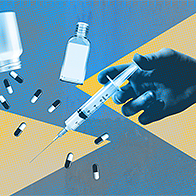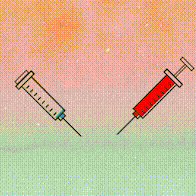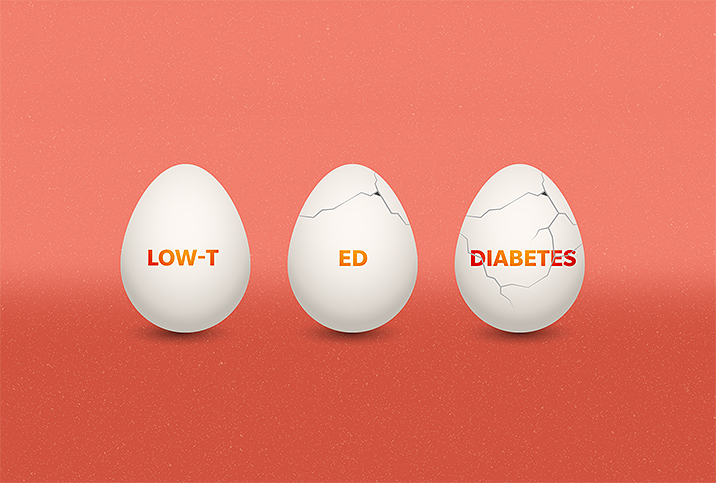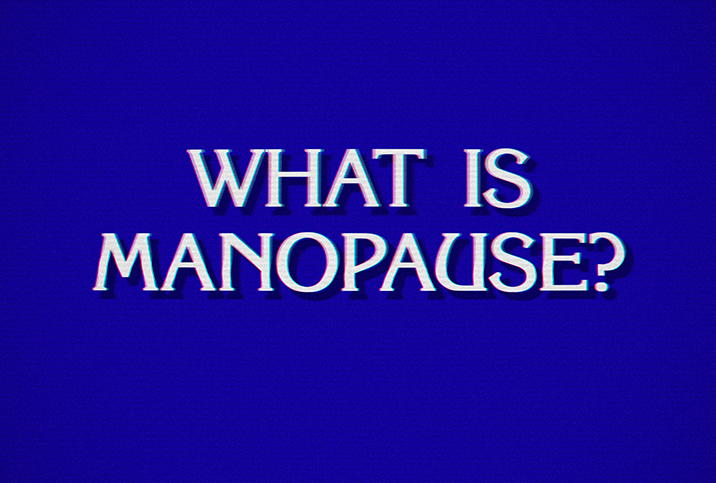We Have Questions: Testosterone Replacement Therapy
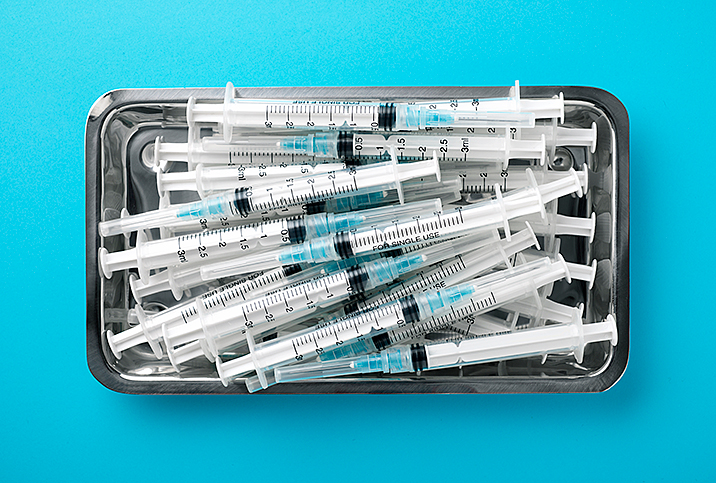
Men have a litany of reasons to believe they're in need of a testosterone boost. Perhaps they've lost interest in the bedroom and motivation to hit the gym, or maybe they're constantly tired and battling a never-ending wave of fatigue.
Declines in testosterone are as inevitable as death, taxes and the Mad Titan Thanos. About 40 percent of men ages 45 and older suffer from low testosterone, also known as hypogonadism. The body's natural production of this sex hormone begins to decline in all men by about 1 percent per year after the age of 30 or 40.
Testosterone replacement therapy (TRT) is becoming a popular option to offset the symptoms caused by the inescapable natural erosion of this "maintenance hormone."
"They'll have an improvement in sexual function, in their libido. The exercise begins to improve in a month or two, and that starts with motivation," said Stanley G. Korenman, M.D., an endocrinologist and affiliate doctor with the Ronald Reagan UCLA Medical Center in Los Angeles, about the effects of TRT.
We spoke with Korenman to better understand the effects of TRT, and when to use and not use it for treatment.
What are some common reasons men seek or need TRT?
It's very age-related. There's a group of men under the age of 40 who become quite symptomatic, and I see a lot of them because I'm a referral center for UCLA. General practitioners can write a prescription, but they generally don't feel as comfortable and refer patients to an endocrinologist.
But men usually start at their general physician with reports that they're fatigued, can't perform in the gym, or when they do, they're exhausted afterward. That's the kind of story a general practitioner gets. They think of a number of things, and at some point, maybe a year into it, they do a testosterone test and find it's low. And then treatment is a good idea.
What details do you look for as an endocrinologist?
What I do is look into the underlying theme of fatigability. I'll ask, "Do you have sleeping problems?" Frequently they do and they'll report they sleep two hours and wake up and can't get back to sleep, or that they sleep all night and still wake up tired. Then I ask if they have problems concentrating, and often they'll say yes. Maybe they're distracted at work and they may not be doing as well.
Then I ask about their sex life, and they'll say, "Now that you mention it" and explain it might not be going well—the interest is down. "My wife wonders why I'm not interested anymore" and "I don't get the pleasure that I used to get."
You mentioned younger men. How do you talk to them about their treatment options?
What I do for younger men, which is not exactly typical, is I ask if they've had an emotionally wrenching experience in the past year or two, such as if they lost a family member, if they went through a divorce or moved to a new environment. Often, the answer is yes and there's a major emotional trigger for the younger guys. I put that into the equation.
Then I ask about mental health problems in their family history, and almost invariably the answer is yes. I put it together this way, and suddenly the underlying theme is depression, and the symptoms they're describing match those for depression in men.
Depression is more commonly diagnosed in women because the studies are mostly conducted with women, but for these men, depression can cause low testosterone, although it's never been clinically proven and I haven't been able to do the experiments myself. What I think happens is, when people get depressed, they put out a lot of cortisol, and that inhibits the hypothalamus and then it doesn't put out enough GnRH [gonadotropin-releasing hormone], which stimulates the pituitary to stimulate testosterone production in the testicles. What I expect to find when I do the labs is that their testosterone is low and their LH [luteinizing hormone] levels are also low.
With the young men who display these symptoms, I treat them with an antiestrogen, which stimulates their hypothalamus, and this usually brings them into the normal range in a week. And I don't have to use testosterone. I do this in addition to treating depression, because what I want is someone to be better as a whole.
A high proportion of these men also have a high body mass index, which reduces your testosterone. Some people just have reduced testosterone because they experience less protein binding of testosterone in the blood.
When you do use testosterone replacement therapy to treat people—older men who don't fall into the categories you mentioned earlier or younger men with hypogonadism—what are the methods you use?
The two methods I use are the daily skin gels and the weekly injection, either intramuscularly [into a muscle] or subcutaneously [into the deepest layer of skin directly below the dermis and epidermis].
You don't get overtreatment from the gels, but the downside is if you have a female partner or a child, some of the gel can get on them and they're very sensitive to testosterone, which can have adverse effects on them.
Another method of administering testosterone is through a capsule in the arm, which lasts for months, but you can't alter the dose. Once it's in, it's in. You can also get sublingual [under-the-tongue] treatment, but that requires you to do it three times per day. There's also a patch, but it's allergenic, and people frequently get red spots around their bodies where they have placed the patches.
I prefer the injection [administered once per week] and gels [self-administered once per day] because they're generally low maintenance in comparison.
What's the experience for a person who starts treatment? What is the first day like and what are subsequent appointments like?
It's pretty simple. First of all, by the time I see them, they usually have low serum testosterone. A doctor likely did the lab tests. Then I draw blood and I look for testosterone-related stuff. I want to make sure they don't have a pituitary tumor; I want to know if they have a cholesterol problem; I want to know if they have diabetes or prediabetes.
Additionally, I want to make sure they don't have low vitamin D, which could be responsible for some symptoms. If I'm convinced by their explanation, I might give them a prescription on the spot and just have them wait till I get the results of the blood draw before we administer the treatment.
The other thing I measure is the blood count. A major effect of testosterone that can cause trouble is the increase of red blood cells in your circulation, which makes your blood thicker—more like ketchup than cranberry juice. If it gets up to a certain point, you can be more prone to clots in your veins or lungs.
I offer the gel or the injections. I tell them the injections are easier to dose because you're taking a certain amount, which you can alter. For the gels, you just apply a small amount to your skin and smear it out, but there's not really a way of changing the dose. A lot of people don't want to inject themselves, so they choose the gels, but the choice isn't embedded in concrete. You can always switch to the other. If I think depression is part of the problem, I also prescribe a psych med, if they're not already on one.
What's the threshold of testosterone you recommend to men?
I like to keep it at a reasonable level, not too high. Men seem to think the higher the better, which is not true. In a study from Scandinavia, they found testosterone of around 500 [nanograms per deciliter (ng/dL)] is best for longevity, so if you're 700, 800, 900, you might feel like, "Oh, boy," but you don't live as long.
What kind of ailments does TRT contribute toward treating?
So this is very controversial. The best studies were just completed about a year ago. One of them focused on bone density, and the other on psychological well-being, among others. Older men are somewhat different from younger men, but the main thing they found uniformly is improved sexual function.
So for the younger guys, as I mentioned, I go about it with a different therapy and it generally works, but it's not with the actual use of TRT.
If reproduction is on your bucket list, then TRT is not good for you.
Now, one of the things about TRT—and this is why I do things differently for younger men at first—is if you use the treatment, your sperm count goes way down, frequently to essentially zero. If reproduction is on your bucket list, then TRT is not good for you. For older men, that's rarely an issue, so I don't have to worry about that. And even if they're not sure at the moment, well, I always make sure to ask, "What would happen if you met someone?"
What are the tangible, physical effects of TRT and how soon do they kick in?
A lot of men feel better pretty fast, in a month. Others take longer. If I'm treating them with psych meds as well, they usually take three to four weeks to have any effect, and I tell them to wait at least about three to four months to feel the full effect of the medication.
They'll have an improvement in sexual function, in their libido. The exercise begins to improve in a month or two, and that starts with motivation. Patients generally talk about their libido and how they're back at the gym. Maybe they're not what they used to be, but they're improving rather than falling apart. Maybe they're sleeping a little better. For my overweight patients, I always try to get them to do a sleep study to see if they have sleep apnea, because it's pretty common, and, of course, I recommend dieting or in some cases obesity surgery to really deal with the problem.
What are the less tangible but important effects of TRT and how are they realized?
So testosterone is good for bone density and reduces the loss of bone density people experience starting at age 30. So you see improvement there, especially if they were already experiencing a decline. Testosterone tends to increase the blood volume or blood pressure, which can be good or bad depending on what it is. If I push it up too far, I have to get it back down. The effect on weight is complicated, but in long-term European studies, it tends to keep weight down, even if appetite is improved.
It decreases your body fat and increases your body's protein, some of which is muscle. It improves muscle function, such as the function of fast-twitch muscle fibers, and has some positive effects on mitochondrial function.
What are some negative aspects to look out for?
It's routine to worry about and ensure the red blood cell count doesn't go too high. If it does, I'll reduce dosage or stop temporarily, and recommend the patient donate blood.
[There's] not a lot else, because testosterone is a maintenance hormone and a brain hormone. For patients who are seriously hypogonadal, they become more confident and more outspoken on the therapy.
It does have effects on the prostate. Testosterone normally stimulates the prostate, but prostate cancers are almost always testosterone-dependent. If a person contracts prostate cancer, what doctors do is try to eliminate testosterone from the body to slow down or halt the cancer from growing.
So for that, a question is, "Does TRT cause or increase the rate of prostate cancer?" The answer is no. And the second question is, "If you already have prostate cancer, will it make it grow?" And the answer is probably yes, so we try to make sure you don't already have [prostate cancer] beforehand. I'll have people take a PSA [prostate-specific antigen] test. As long as the PSA stays low, we're OK. If it starts going up, these days, we'll have an MRI [magnetic resonance imaging] of the prostate to determine what's going on there.
Are there misnomers and misconceptions that you have to correct for patients? What are some of the most common?
Well, as I said, some people want more. Some of them will come after I treat them and their testosterone is 500 or 600 ng/dL and they'll ask, "If I take more, will I feel better?" However, if depression is part of the picture, they won't get to 100 percent, because we don't have anything absolutely curative. I try to deal with that, as well, so they feel better. Depression is the major cause of a loss of sexual interest and it's woefully underdiagnosed in men.
Do men who receive the treatment stay on TRT?
There are lots of patients who decide they don't feel all that different and stop the treatment because it's an annoyance. There are some studies that indicate a large majority of men take it for less than a year. We don't know what happens to their testosterone after they stop. My problem is a large portion of the men I work with stop coming in. Some men stop taking the medication and the others just have their generalist administer the treatment, but as a result, I don't know how many people in my practice go off it. There's a lot of evidence indicating that most guys just go off it.
Are there any other aspects people should know about this therapy?
Yeah, just that everything I told you relates to people who have had normal puberty or people who experienced the normal timeline for the growth of their penis and testicles. For people who haven't experienced full pubertal development, there are things that could and should be done for their health and well-being. I treat men like that, too, who have incomplete penile development, small testicles, incomplete masculinization, as well as men who have lost their testicular function due to surgery, chemotherapy or accidents, and they should be seen, diagnosed and treated appropriately.







